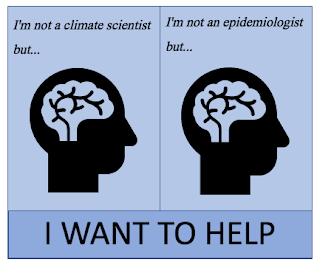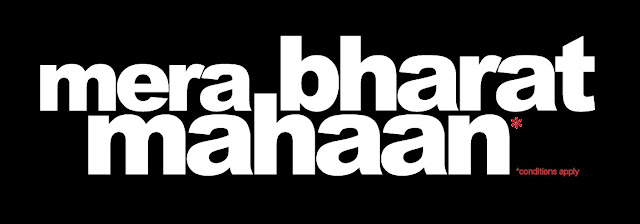Public discussions in the time of crises
As the corona crisis as well as the fight against it marches on, the public discussion is beginning to remind many of us of the discourse around the climate crisis. Both are global crises which must be solved with public policies aligned with scientific understanding. And both seem marked by similar misplaced good intentions and disunited efforts - disunited not just by chance but also by false dichotomies ("environment/epidemiology vs economics").
As I write this, I am thinking of the thousands of scientists around the country who are, to varying extents, able and eager to help during the corona crisis. I write this to extend an invitation to scientists to join public conversations, with the hope that the courtesies being requested for the corona conversation would also be extended to the climate conversation.
1 You will not become an epidemiologist / climate scientist overnight — and you shouldn't.
Julia Gog, a mathematical epidemiologist, wrote a remarkable article on how physicists can help with COVID-19 modelling. It is a must-read if you are itching to help, whether you are a physicist or not and whether you have tried to model the epidemic or not. The central point remains - It does not help to rediscover known results. But it is not merely a question of "do unto others" regarding respect for expertise; it is also a question of best utilizing your own expertise. Why should you try to become an epidemiologist or a climate scientist to help? Both crises are multi-dimensional. If only one expertise could answer all questions, it would hardly turn into a global crisis. You are needed in your own role.
2 Go upstream.
Most climate scientists are regularly stumped by how little concern their ominous discoveries are eliciting. Part of the problem is that the discussion revolves more around the inclinations or associations of who is talking about those results. Bias is a real and important problem and it must be called out. However, as scientists, we have the luxury of going upstream in the flow of information and deciding issues based on scientific results rather than political or media biases. Biases should be identified on the basis of scientific results, and not the other way round. There will always be multiple conversations for you to contribute to but there is great benefit to amplifying the right conversation.
3 Avoid false dichotomies.
The debate is not "climate vs economics" or "public health vs economics". The actual conflict is science vs pseudo-science. (The same principle could be extended to history vs pseudo-history and economics vs pseudo-economics, etc.) Science is only one factor in decision-making, and neither climate scientists nor epidemiologists claim it is the most important one. However, it must be recognized that the scientific factor is often the most precisely known and non-negotiable. We cannot negotiate with carbon dioxide to trap less heat in the atmosphere, but we can use economic tools such as subsidies to incentivize industrial processes that produce less carbon dioxide. Even with due recognition of the fact that some factors are more "final" than others, such dichotomies only divide people who are fighting the same crisis. If you must divide people into groups, consider who operates on the basis of most information, not on different kinds of information. Such a dichotomy would also reveal the basis and necessity of academic camaraderie; it is not professional alliance but professional values that put us on the same side. (These values are hardly restricted to the academia though!) A quest for the greater good must not overlook the greater bad.
It can be quite unsettling to be a scientist in a field unrelated to the ongoing crisis. In such a situation, we can all help by raising awareness in our respective capacities. I wish for a world where more academic honesty and rigour is brought to public conversations. But if the climate conversation has taught me anything, it is that one would be remiss to extrapolate academic values onto the whole world.
To subscribe to such posts:
▁▁▁▁▁▁▁▁▁▁▁▁▁▁▁▁▁▁▁▁▁▁▁▁▁▁▁▁▁▁▁▁
To subscribe to such posts:




Comments
Post a Comment